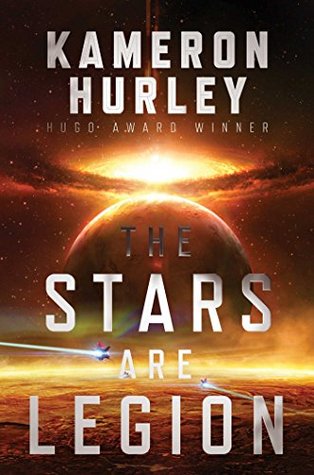Whenever I go into Bakka Phoenix in Toronto, I try to pick up a book by an author I've never read, but have heard of. Often, this means an author I've somehow started following on Twitter, without having delved into their books. I always mean to someday, and this is a way I can. So in the spring, this was the book I picked up. It got put aside while I read the Hugo nominees (the release of the longlist a few days ago shows how close this book came to being part of that reading project), but I finally picked up Kameron Hurley's work and read it.
I don't know where I would have ranked The Stars of Legion on my Hugo ballot, had it made it on, but it would definitely have been a worthy addition to that list - and I've said before that the best novel nominees were a very strong bunch. This was a lot of fun, often troubling and a little gross, with great emotional arcs and lots of betrayal.
The world Hurley has created here is very compelling, and twisty. On ships that are worlds, or worlds that are ships, the Legion moves through space. If it had a central mission, that seems like it was lost long ago. The action take place on the outer rim of the Legion, where a ship/world (the Mokshi) broke out of the inner core and stayed. It's in much better shape than most of the worlds/ships on the outer rim, and so everyone wants it, for that, and for any weapons it might hold.
These are huge places, and those who live on the levels near the surface of the worlds know little of the many, many levels closer to the middle. They don't even really have myths about them - things have gone on so long that there are no stories of places they're trying to reach, of the people below them, only of the wars that have raged between worlds as warlords try to conquer other worlds to strip to save their own.
I say people, but it is a fact that all the people in these worlds are women, and, like many other things that have been lost (if they have been lost) is even the idea of men. By which I mean, it comes up not even once. Women on the ship sometimes give birth to large furry cogs that the ship needs, but if babies are born, they are female, and have always been female and will always be female. This is not a universe where an alternative idea exists.
The story centers around two women - Jayd, the daughter of Anat, warlord of Katazyrna, and Zan, a woman without a memory, although those around her seem to remember her just fine. She has small glimpses, enough to both desire Jayd, and not trust her, and this is exacerbated by everything that happens. Zan is told that she is a general who is the only one to have ever penetrated the defenses of the Mokshi, and that she must go back to do it again, for Katazyrna is slowly dying, and Mokshi is not. (This is not a battle to transfer a people to another world, but to sacrifice the life of another world in order to prolong the life of one's own.)
Zan is there as part of Jayd's plan comes to fruition, and she is sent to be wed to another warlord, but as such plans often do, it does not survive first contact, and Jayd is left alone to try to continue her scheme, while Zan is thrown down a refuse chute to the bottom of the world, and must slowly, painfully, climb her way back out, through different levels that have entirely different cultures, past interior geography that is as complex as you would expect to find on the exterior of a planet.
In the refuse, she finds an old, deformed woman who might know a former version of her, and on her travels, she finds two other women who grumble but will not abandon her. As Zan creates a community, Jayd grows more alone with the tatters of her previous plan, trying to snatch a victory while being unutterably alone. It all hinges, yet again, on how these women give birth, and what they can give birth to, other than children. To a world? What are these worlds, anyway?
The answer comes briefly at the end, and it's so delightfully intriguing that I didn't need more. Although I wouldn't mind knowing more, either. We get some clues to an answer to how these worlds have changed, how these women have changed, how adaptation works through untold time hurtling through space with other worlds near enough to attack and plunder. Is there another way?
We get a glimpse of possibility, but no firm answers. But this wasn't an unsatisfying end - one journey is done, and another is beginning.

No comments:
Post a Comment